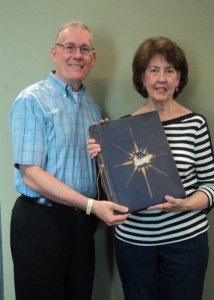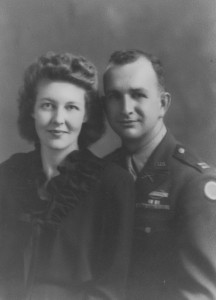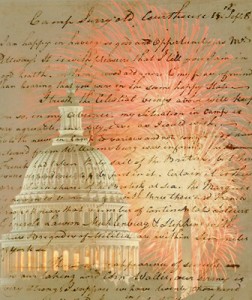“My Dearest”
“Last night was the first night that has gone by since I left you without my writing to you! I think that was the hardest part of the whole day! Oh, darling, I’ll never be able to tell you the anguish I’ve been in since I got that nasty telegram. I thought–first–only that I’d never see you again–never wake up beside you anymore–never have your babies–never never anything anymore! But then I thought of all the ways it were possible to get you out safely! So now I’m beginning to hope again.”
So begins Aline Shrewsbury’s short journal on 4 August 1944, shortly after she received a telegram stating that her husband, Ralph Damon Shrewsubry, was missing in action. The couple had been married less than two years when the dreadful missive arrived. Aline’s journal from 4th to 21st of August 1944, along with photographs, service records, family correspondence, and news clippings documenting Ralph’s WWII career were recently donated to the Manuscripts & Folklife Archives unit of the Department of Library Special Collections by the couple’s daughter and former WKU Educational Resources Center librarian Becky (Shrewsbury) Leavy.

Becky Leavy donates the Shrewsbury Collection to Manuscripts & Folklife Archives Coordinator Jonathan Jeffrey
This small collection documents the story of the unlikely meeting, and subsequent whirlwind romance, of a Georgia medical secretary at Camp Blanding, Florida, Aline Lanier, and Lieutenant Ralph Shrewsbury from Caneyville, Kentucky. Shewsbury had participated in ROTC training at WKU prior to the war. Aline and Ralph married only a few months after meeting. Wartime marriages are difficult for both partners, but the spouse left behind can imagine all types of distress. Ralph did have quite an adventure after landing at Utah Beach in June 1944. Part of the collection features Ralph’s narrative about his stay in a German-occupied hospital in France. In relation to nourishment, he noted: “The usual fare at the hospital was a tea made of apple leaves and a quarter of a loaf of bread for breakfast, and sometimes not even the bread. At noon we received a very small bowl of thin soup. For supper we usually had a bowl of soup or stew containing very little nourishment. Some of the French people working in the hospital brought us eggs and bread on the sly.” Eventually he escaped from a transport train en route to a POW camp. After finding American soldiers, Shewsbury by chance reunited with his old WKU ROTC commander E.B. Crabill. It is a small world after all.
To investigate other WWII collections archived at WKU, click here.






